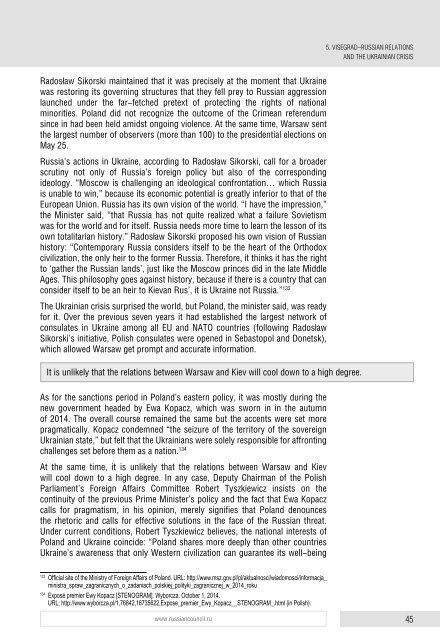RIAC-Visegrad-Report22-Eng
RIAC-Visegrad-Report22-Eng
RIAC-Visegrad-Report22-Eng
Create successful ePaper yourself
Turn your PDF publications into a flip-book with our unique Google optimized e-Paper software.
5. VISEGRAD–RUSSIAN RELATIONSAND THE UKRAINIAN CRISISRadosław Sikorski maintained that it was precisely at the moment that Ukrainewas restoring its governing structures that they fell prey to Russian aggressionlaunched under the far-fetched pretext of protecting the rights of nationalminorities. Poland did not recognize the outcome of the Crimean referendumsince in had been held amidst ongoing violence. At the same time, Warsaw sentthe largest number of observers (more than 100) to the presidential elections onMay 25.Russia’s actions in Ukraine, according to Radosław Sikorski, call for a broaderscrutiny not only of Russia’s foreign policy but also of the correspondingideology. “Moscow is challenging an ideological confrontation… which Russiais unable to win,” because its economic potential is greatly inferior to that of theEuropean Union. Russia has its own vision of the world. “I have the impression,”the Minister said, “that Russia has not quite realized what a failure Sovietismwas for the world and for itself. Russia needs more time to learn the lesson of itsown totalitarian history.” Radosław Sikorski proposed his own vision of Russianhistory: “Contemporary Russia considers itself to be the heart of the Orthodoxcivilization, the only heir to the former Russia. Therefore, it thinks it has the rightto ‘gather the Russian lands’, just like the Moscow princes did in the late MiddleAges. This philosophy goes against history, because if there is a country that canconsider itself to be an heir to Kievan Rus’, it is Ukraine not Russia.” 133The Ukrainian crisis surprised the world, but Poland, the minister said, was readyfor it. Over the previous seven years it had established the largest network ofconsulates in Ukraine among all EU and NATO countries (following RadosławSikorski’s initiative, Polish consulates were opened in Sebastopol and Donetsk),which allowed Warsaw get prompt and accurate information.It is unlikely that the relations between Warsaw and Kiev will cool down to a high degree.As for the sanctions period in Poland’s eastern policy, it was mostly during thenew government headed by Ewa Kopacz, which was sworn in in the autumnof 2014. The overall course remained the same but the accents were set morepragmatically. Kopacz condemned “the seizure of the territory of the sovereignUkrainian state,” but felt that the Ukrainians were solely responsible for affrontingchallenges set before them as a nation. 134At the same time, it is unlikely that the relations between Warsaw and Kievwill cool down to a high degree. In any case, Deputy Chairman of the PolishParliament’s Foreign Affairs Committee Robert Tyszkiewicz insists on thecontinuity of the previous Prime Minister’s policy and the fact that Ewa Kopaczcalls for pragmatism, in his opinion, merely signifies that Poland denouncesthe rhetoric and calls for effective solutions in the face of the Russian threat.Under current conditions, Robert Tyszkiewicz believes, the national interests ofPoland and Ukraine coincide: “Poland shares more deeply than other countriesUkraine’s awareness that only Western civilization can guarantee its well-being133Official site of the Ministry of Foreign Affairs of Poland. URL: http://www.msz.gov.pl/pl/aktualnosci/wiadomosci/informacja_ministra_spraw_zagranicznych_o_zadaniach_polskiej_polityki_zagranicznej_w_2014_roku134Exposé premier Ewy Kopacz [STENOGRAM]. Wyborcza. October 1, 2014.URL: http://www.wyborcza.pl/1,76842,16735622,Expose_premier_Ewy_Kopacz__STENOGRAM_.html (in Polish).www.russiancouncil.ru45


